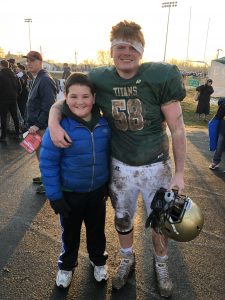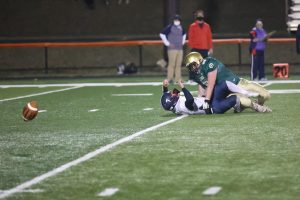Successful Outpatient Meniscus Repair

I first met Emmet his junior year, on the sidelines of his Varsity Football team’s home field.
After a tackle, his right knee was hurting. When I examined him, he told me he had injured his LCL the previous year, but that this injury felt different. My examination demonstrated tenderness on the outside of his knee along the joint line but there was no swelling in the knee and he had full range of motion. I advised him to check in with the athletic trainer before practices and games and to keep an eye on the symptoms. He and I agreed that football is a rough sport and bumps and bruises are a daily occurrence.
Emmet spent the next several weeks nursing his injury, wearing a supportive brace on and off the field, resting and icing his knee after practices and the four remaining games of the season.
Avoiding Surgery:
Most of my patients try to avoid surgery at all costs. Emmet and his parents were no different. Emmet did not want to downtime of a surgery and the subsequent physical therapy necessary for full recovery. Emmet’s parents were hopeful that the injury would heal when his season ended and the knee had an opportunity to rest. I always try to work with families to exhaust all non-surgical options before recommending surgery for student athletes.
“I was feeling down because no matter how careful I was, how protective, or how attentive I was with icing, I couldn’t keep the pain at bay when I ran, “explained Emmet. “I felt the injury every time I stood up or climbed stairs, which as a was pretty often. What’s worse, I was inadvertently playing tentatively in order to protect my knee. I wasn’t happy with my performance and I knew I could do more to contribute on the field, but I couldn’t make it happen.”
 Deciding to Perform Surgery:
Deciding to Perform Surgery:
When the season ended, the pain persisted and Emmet kept hoping the injury would heal. He continued to wear his knee brace daily to school, and although he was no longer playing football, his mobility was limited.
In early March, Emmet’s knee pain was exasperated in a pick-up basketball game. His mother contacted me and I advised them to bring Emmet for an x-ray at OrthoIllinois, InjuryExpress. When that x-ray showed no fractures, I ordered a follow up MRI. The MRI showed a meniscus tear which is the cartilage between the bones of the knee. We scheduled Emmet for a diagnostic arthroscopy and possible lateral menisectomy, to be performed out patient at the OrthoIllinois Surgery Center.
Meniscus surgery:
Once in surgery, I discovered that Emmet’s meniscus was discoid in nature, meaning that it was oval rather than crescent shaped tear. The meniscus was too large. This is a congenital condition that he was born with and making him more prone to injury. A discoid meniscus can perform normally for the life-time of a patient but its commonly injured in high school athletes and young adults who participate in sports. It can be difficult diagnosis as it doesn’t present like a typical meniscus tear unless an MRI is obtained. We were able to remove the excess discoid portion of the meniscus along with the tear. The procedure basically returns the meniscus to its normal shape and function.

Successful Recovery:
I’m not surprised that Emmet’s recovery went as well as it did. Athletes are motivated to heal and put a lot of focus into their physical therapy and recovery protocols. “I appreciated the weekly sessions with Adam at OrthoIllinois Physical Therapy Center,” explained Emmet. “It gave me lots to work on and empowered me recognize my strength and mobility increasing throughout my recovery.”
Emmet went on to have a successful spring Senior season, even if it was abbreviated by COVID-19. He led his team in squats in the weight room, and found himself on the field more than he had his previous year. Emmet no longer hesitated to protect an injury in making tackles or sacks and was quick enough to recover fumbles. He has committed to play football for Loras College this fall. Emmet is thrilled with his outcome. “I couldn’t be more grateful to Dr. Trenhaile and his team for helping me manage my injury,” says Emmet. “Without them, I wouldn’t be able to pursue the opportunities in my sport that I have before me today.”

